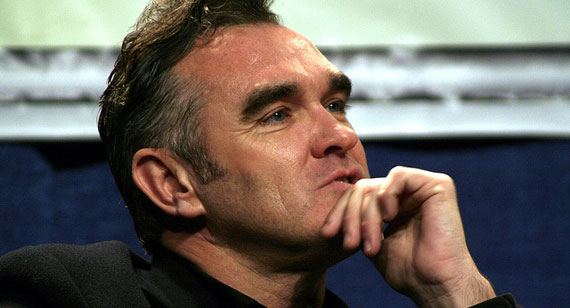Morrissey’s Most Controversial Statements

“I’ve never intended to be controversial but it’s very easy to be controversial in pop music because nobody ever is.” It’s hard to take Morrissey’s denial that he isn’t deliberately acting like pop music’s biggest troll too seriously considering there doesn’t seem to be a week that goes by where he isn’t shooting his mouth off about something or other.
Of course, many of his moans are harmless enough, whether it’s deriding William and Kate (“so dull as people that it is actually impossible to discuss them”), dismissing the culture of dance music (“…the refuge for the mentally deficient. It’s made by dull people for dull people”) or belittling the value of the BRIT Awards (“I never would accept a Brit. It would be like Laurence Olivier being happy getting a TV Times award”).
But ever since he arrived on the scene as the gladioli-waving Oscar Wilde-reading frontman of The Smiths in the early 80s, he’s also been prone to overstepping the mark on a worryingly regular basis. Prime Minister Margaret Thatcher was perhaps the first to bear the brunt of his vicious tongue after calling for her head in a 1984 interview (“She can be destroyed. It is the only remedy for this country at the moment”), a theme he continued on his first solo album, Viva Hate, with the track “Margaret on the Guillotine.”
Almost 20 years later and another Tory leader was getting it in the neck after Morrissey took umbrage with David Cameron’s public admiration for The Smiths (“It was not for such people that either Meat Is Murder or The Queen Is Dead were recorded”). US politicians weren’t immune from his bile either. After announcing the death of Ronald Reagan at a 2004 gig, he told the Dublin crowd he wished it was George W. Bush instead, later claiming that he “had single-handedly turned the United States into the most neurotic and terror-obsessed country on the planet.”
Morrissey has been equally quick to voice his disdain for those in the same industry as him, describing Madonna as “closer to prostitution than anything else,” picking fights with everyone from George Michael to The Cure’s Robert Smith to Elton John, whilst even wishing that Morrissey & Marr: The Severed Alliance author Johnny Rogan “ends his days very soon in an M3 pile-up.”
However, his militant stance on animal rights has landed him in far more trouble. In 2006, he was chastised by Conservative MP David Davis after appearing to condone the aggressive tactics of the Animal Rights Militia (“I understand why fur-farmers and so-called laboratory scientists are repaid with violence—it is because they deal in violence themselves and it’s the only language they understand.”). In the same year he boycotted a Canadian tour in protest of the country’s annual seal hunt (“a barbaric and cruel slaughter”); in 2009, he abandoned his set at the Coachella Festival because of the smell of cooking meat (“I can smell burning flesh and I hope to God it’s human”); while earlier this year he described Chinese people as a ‘subspecies’ in a response to their treatment of animals.
But perhaps the most insensitive and ill-judged statement of his career was uttered during a show in Warsaw, where just two days after Anders Breivik’s horrific attack left 69 Norwegians dead, Morrissey declared that the massacre “was nothing compared to what happens in McDonalds and Kentucky Fried Chicken every day,” an opinion he later clarified as “If you quite rightly feel horrified at the Norway killings, then it surely naturally follows that you feel horror at the murder of ANY innocent being.”
However, it’s the allegations of racism, most of which have appeared courtesy of the NME, which have damaged his godlike status amongst the middle-aged indie fraternity more than anything else. In 1992, the weekly music publication accused him of promoting fascist imagery after he performed in front of a Union Jack and two female skinheads at the Madstock! gig at Hyde Park. 15 years later, the same magazine accused him more directly of holding racist views following an interview which touched upon issues of immigration and national identity. But after Morrissey launched a legal suit against the magazine for their insinuations, a matter which was eventually settled out of court, he was issued an apology on their official website which stated they did not believe him to be racist.
Whether you completely agree with every single one of Morrissey’s outspoken views or whether you feel he’s little more than an ill-informed and out-of-touch grumpy old man, it seems fair to say that pop would be a much more boring place without him.
